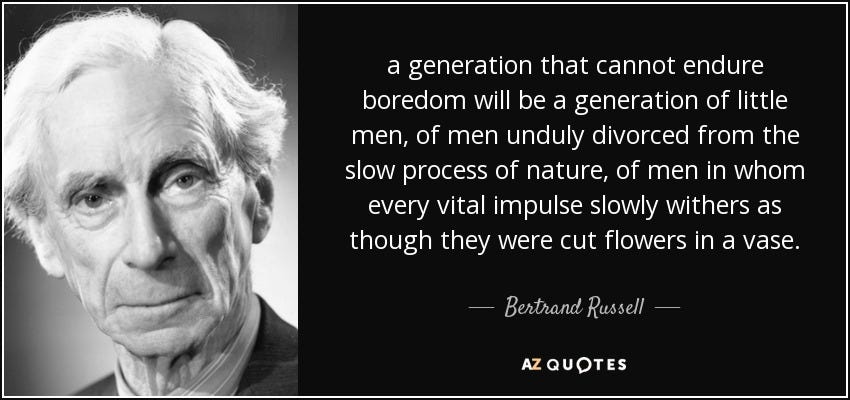
Cheetos, weed, crack, Coors;
Ebay, relationship drama, gossip, meddling; Netflix, YouTube, Instagram;
texting, internet surfing, Email; gaming, fantasizing—when we are in what Sober Nation calls “H.A.L.T.” mode (Hungry, Angry, Lonely, Tired), we reach for
our fixes. Even more, what Halts us most is the space between this and that—Boredom.
Call it tedium, dullness, deadliness,
dreariness, monotony, tiresomeness, ennui, world-weariness—it’s the nothing-to-dos, the doldrums, the at-a-losses. The yawn. For those who know about creativity, who know
about magic and the divine—it’s the door.
Nothing is the precursor to everything. It’s the vacuum which Aristotle said “the
universe abhors.” It’s the Possibility
in which our great American poet Emily Dickinson dwelt. Artists, mystics, saints,
genius mathematicians such as Bertrand Russell (quoted above), and everyday meditators
know that there comes a moment of radical nothing.
I know, it’s happened to me. And it
is so huge, so unfathomable, that it both terrifies and fills me with awe. Wow! It’s the ultimate liberation. Other’s might call it “God.” And that makes sense—it’s out of nothing that
the divine in myths created everything.
One metaphor for the brain is a series of interlocking gears:
Boredom is a
gear that can’t find a notch in which to settle. The expression spinning your wheels captures the going-nowhere experience of boredom. Boredom
is the unfocused mind spinning, spinning; scanning, scanning; Scrolling,
Scrolling (see post on this blog site); like a desperate gear looking for a notch in which to settle. (It’s
me repeating the same thing in this paragraph, not providing you some place new
to engage.)
So it’s a matter of deciding who’s
in charge. Who will focus your mind? What matters to me? Who’s in charge?
Marketers, software engineers,
infomercials—Google, Amazon, YouTube, Apple, Weight-Watchers, among others—create
systems that will generate repeat and infinite business. They are not our friends. They are money-makers. Thousands of books, university departments, and
training firms teach businesses how to addict us to their products and services—and
thus to shell out money to them and to their advertisers. They manipulate us into believing that they
are our saviors—from hunger, anger (and other unpleasant feelings), loneliness,
tiredness; and, most of all, Boredom.
Their techniques are to provide novelty, quick fixes, cheap thrills.
As
with every worthwhile avenue of growth and momentum, the first step is to wake
up! When I’m bored, when I’m tempted to reach for my fix, I asked myself “What
just happened?” Am I in HALT? Am I bored?
Can I take care of my huger, my anger, my loneliness, my fatigue in an
appropriate way that honors my best self?
If I’m bored, I have an opportunity to enter the great realm of
possibility.
(1)
Wake up!
(2)
Name my
experience
(3)
If it’s H.A.L.T.:
Manage needs in appropriate ways (eat, address emotion, find someone in person,
sleep)
If it’s the Angel of Boredom:
(4) Stop!!!
(5) Name that
addiction
(6) Don’t give in to
the addiction
(7) Feel the
discomfort
(8) Take ten deep
breaths and/or
(9) Meditate and/or
(10)
Go outside and
(11)
Listen
(12)
Look
(13)
Wait for it
(14)
Wait for it
(15)
Aha!
The mind knows how to take care of
itself, if we let it. Before long, some
worthy idea, some solution to a problem, some creative insight, some generative
course of action will occur to you. You
have accessed your Greater Mind—your unconscious where, like a factory of
elves, all of your answers are being created and are stored. For those of you who believe in a divine, the
process is to Let Go, and Let God.
Media
Ecology—the study of how, literally, systems Mediate between us and our better
selves—helps us to wake up. Neil
Postman, the founder of the discipline, warns us in the title of one of us
books, that we are Amusing Ourselves to
Death.
Think
of embracing Boredom as
Giving
Yourself Space
Taking
care of what matters
“Dwelling
in Possibility”
Preparing
the way
Enticing
the Muse
I
promise, you will vastly improve your
Memory
Creativity
Energy
Relationships
Access
to Joy
When
are you bored? How do you respond? How can you take hold of your life and use
Boredom as a tool for creativity and successes?
How can you, following Bertrand Russell’s image, stop cutting yourself
off and get rooted in your own life?
Here's a memorable quote from Holiday Mathis's column Your Stars:
It may seem counterintuitive, but it's the absence of color and light that will be the most stimulating. Blank spaces invigorate your most creative instincts. (Libra: 3.12.20)
Here's a memorable quote from Holiday Mathis's column Your Stars:
It may seem counterintuitive, but it's the absence of color and light that will be the most stimulating. Blank spaces invigorate your most creative instincts. (Libra: 3.12.20)
Works Cited:
Art:
Cover Art: A-Z Quotes
Text:
Dickinson, Emily. “I dwell in Possibility.” The Poems of Emily Dickinson. Ed. R. W.
Franklin.
Boston: Harvard UP, 1999.
#466.
Postman,
Neil. Amusing Ourselves to Death. New
York: Penguin, 1985.